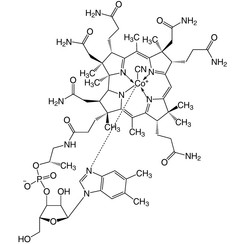You have no items in your shopping cart
Vitamin B12
Vitamin B12, also known as cobalamin, is a water-soluble vitamin involved in the metabolism of every cell of the human body. It is one of eight B vitamins. It is a cofactor in DNA synthesis, and in both fatty acid and amino acid metabolism. It is particularly important in the normal functioning of the nervous system via its role in the synthesis of myelin, and in the maturation of developing red blood cells in the bone marrow.
Vitamin B12 is the largest and most structurally complex vitamin. The vitamin exists in four near-identical chemical forms (vitamers): cyanocobalamin, hydroxocobalamin, adenosylcobalamin and methylcobalamin. Cyanocobalamin and hydroxocobalamin are used to prevent or treat vitamin deficiency; once absorbed they are converted into adenosylcobalamin and methylcobalamin, which are the forms which have physiological activity. All forms of vitamin B12 contain the biochemically rare element cobalt (chemical symbol Co) positioned in the center of a corrin ring. The only organisms to produce vitamin B12 are certain bacteria, and archaea. Bacteria are found on plants that herbivores eat; they are taken into the animals' digestive system, proliferate and form part of their permanent gut flora, producing vitamin B12 internally.
Most omnivorous people in developed countries obtain enough vitamin B12 from consuming animal-sourced foods, including meat, fish, fowl, milk and eggs. Grain-based foods can be fortified by having the vitamin added to them. Vitamin B12 supplements are available as single or multivitamin tablets. Pharmaceutical preparations may be given by intramuscular injection Because there are few non-animal sources of the vitamin, vegans are advised to consume a dietary supplement or fortified foods for B12 intake, or risk serious health consequences.Children in some regions of developing countries are at particular risk due to increased requirements during growth coupled with diets low in animal-sourced foods.
The most common cause of vitamin B12 deficiency in developed countries is impaired absorption due to a loss of gastric intrinsic factor, which must be bound to food-source B12 in order for absorption to occur. A second major cause is age-related decline in stomach acid production (achlorhydria), because acid exposure frees protein-bound vitamin. For the same reason, people on long-term antacid therapy, using proton-pump inhibitors, H2 blockers or other antacids are at increased risk. Deficiency may be characterized by limb neuropathy or a blood disorder called pernicious anemia, a type of megaloblastic anemia. Folate levels in the individual may affect the course of pathological changes and symptomatology of vitamin B12 deficiency.

